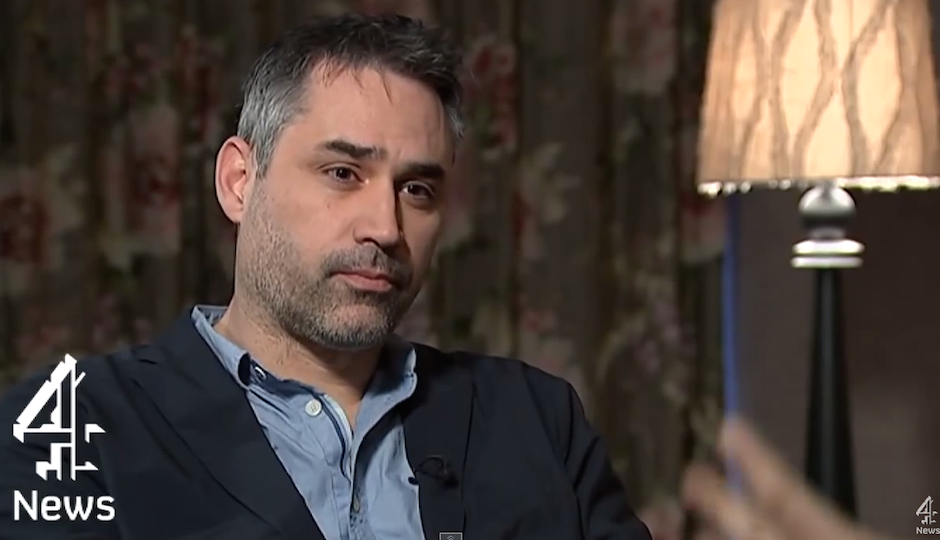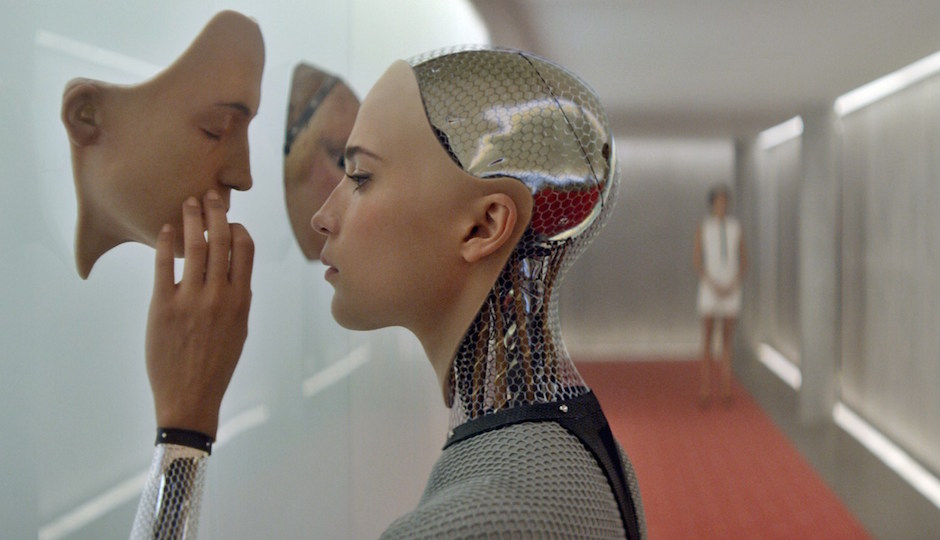Rapid-Fire Q&A With Ex Machina Director Alex Garland

Screenshot from Channel 4 Video
As a screenwriter, Alex Garland has achieved his greatest success working alongside director Danny Boyle in such notable sci-fi works as The Beach, 28 Days Later, and Sunshine. For his directorial feature debut, the 45-year-old native of London chose to make another one of his scripts, the complex and riveting sci-fi thriller Ex Machina, which has earned him high-praise and fawning early reviews. The film concerns a half-mad billionaire tech genius (played by Oscar Isaac), who brings one of his star programmer employees (Domhnall Gleeson) out to his massive, remote laboratory somewhere in the Pacific NW in order to test his latest creation: a stunning, robotic AI (Alicia Vikander), as beautiful as she is intelligent. As the trio spend time with one another it becomes clear the tension between the creator and his invention is far more serious — and dangerous — than either lets on at first.
In town to promote the film, the director generously held forth about his body of work, the first film he ever adored, and his fixation with Formula 1 cars.
If you pursued any other career what might it have been?
Formula 1 racecar driver. I love the idea of doing it. Have I ever done it? No. But I did work as a journalist covering Formula 1 a long time ago. The idea of driving these incredible cars really fast looks like a lot of fun.
Outside of film, what is your favorite pastime?
What I really like to do is travel. I’m an old backpacker; like a hippie with short hair. I used to spend a lot of time backpacking; I don’t backpack anymore, I stay in better hotels than the flophouses I used to stay in, but I still do a lot of traveling, and I really love it. It’s my favorite thing, going to different parts of the world, interesting places, and seeing what’s there.
Any one place in particular?
About 25 years ago, I was in Myanmar, or Burma — different people use different names — and I just went back there a few weeks ago with my wife and children. I went back to some of the places I’d been to nearly a quarter of a century ago, and also to places I’d never been before. It had always stayed in my memory as being pretty much the most amazing place I’d been, but there was a political situation there, and [Burmese activist] Aung San Suu, a dissident leader on house arrest, had said quite explicitly, please don’t come to the country because you’re basically supporting the regime here, so people stopped going. I was waiting for the chance to go back. Eventually she said okay, you can come in now. It was as good as I remembered. Better than I remembered, honestly.
If it were possible to boil down your work to one central theme, what would it be?
Distrust.

Scene from Ex Machina
Is it difficult for you to talk about your process?
I know some people are like that, it’s kind of talismanic: if they talk about it, they’ll break the spell. I don’t give a fuck about that. I basically think of my job as mechanics: It’s like understanding how a car engine works and you’re trying to tune it and you’re thinking this isn’t firing right, or why is this sounding wrong so you turn a couple of screws and tighten some bolts and you think it sounds better. In some respects, stories are like math equations: When they’re all presented properly, there’s an elegance to them, but sometimes, it doesn’t matter how many times you go through it, you keep getting the wrong answer. The answer should be 101, but you keep getting 86, and you change this and you change that and you change one thing to a cube root or whatever, and it still doesn’t work. I’ve abandoned many stories after several drafts of a script because I realize there’s something deep in the equation that’s broken. If it doesn’t want to go, then forget it, ditch it. Start something else. I’m very unemotional about dropping stories.
What’s the first film you ever loved?
It’s really hard to answer that. There’s a way you love films as a kid, but it’s not the way you love them as an adult, where you understand stuff about them in a different way. Maybe Alien. It’s an incredible film, a beautiful, beautiful bit of filmmaking.
Finally, how hard is it to cast for a robot?
The hardest thing isn’t choosing who is the right actor, it’s whether you can get them to agree to do it and whether you can get the financier to agree, because they have a different set of priorities a lot of the time. But recognizing good actors is really quite easy. I’ve never met anyone who says Philip Seymour Hoffman was a bad actor. I have literally never met anyone who says that, and if they did say it, you’d just think they were an idiot.
Ex Machina opens this Friday, April 24, at the Ritz East in Philadelphia.
Piers Marchant is a film critic and writer based in Philly. Find more confounding amusements and diversions at his blog, Sweet Smell of Success, or read his further 142-character rants and ravings at @kafkaesque83.


